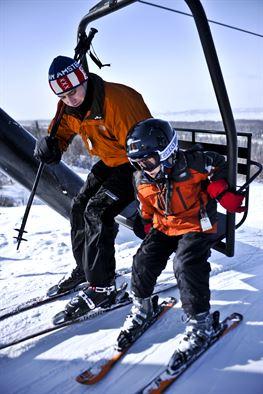In the first few days of the new year, the rules governing customer risk and the responsibilities of ski resorts, particularly in Colorado, have undergone some noteworthy clarification.
In two separate rulings issued days apart, here are the two main takeaways: Those who use the slopes and ride chairlifts do so at their own risk, and if you're looking to bring a service dog along for that ride expect to be turned away.
In the first case, which holds the most wide-ranging impact, a federal appeals court determined that when a skier purchases a lift ticket or signs a release to join a ski lesson, he or she is entering into a contract that prevents that individual from suing the resort if an injury were to occur.
Which means from a standpoint of safety, exercising greater caution on the slopes is now even more important than ever. That's because not only will an accident undermine your health, but in addition, there's no one to blame and you'll be paying the medical bills if a mishap occurs. Therefore, it would be wise to be more aware of your surroundings, as well as the changing terrain and weather conditions.
The other ruling determined that ski lift operators are permitted to bar service dogs from this type of aerial transport because the open-air nature of the chairlift poses a safety threat to the canine, and other customers or staff below. Separate rules govern travel on enclosed trams and gondolas.
 But back to the first case: The U.S. Court of Appeals for the 10th Circuit ruled that an action brought by Dr. Teresa Brigance, a novice skier at the Keystone resort who broke her leg in March 2015 while attempting to exit a chairlift, was invalid because “the waiver that Dr. Brigance signed before participating in her ski lesson, as well as the waiver contained on the back of her lift ticket, are enforceable and bar claims against Vail Summit Resorts Inc.,” which owns Keystone.
But back to the first case: The U.S. Court of Appeals for the 10th Circuit ruled that an action brought by Dr. Teresa Brigance, a novice skier at the Keystone resort who broke her leg in March 2015 while attempting to exit a chairlift, was invalid because “the waiver that Dr. Brigance signed before participating in her ski lesson, as well as the waiver contained on the back of her lift ticket, are enforceable and bar claims against Vail Summit Resorts Inc.,” which owns Keystone.
While unloading at the top of the slope, the Florida orthodontist got her ski boot caught between the chair and the snowy ground. While the lift slowed down during the incident the chair operator didn't bring it to a complete stop, a decision that Dr. Brigance claimed snapped her femur. She sought multi-million-dollar relief but the court rebuffed her, drawing on precedents which held that skiers voluntarily enter into the risky endeavor, an activity that is "recreational" and not necessary.
“The ski and ski lesson services offered," wrote the court, "are recreational in nature and do not constitute essential services or matters of practical necessity."
All of which means that even if a ski resort had a slope-side hazard, or its employees created an unsafe condition or failed to correct an existing one, the facility is not responsible. How this ruling applies to other states is unclear. But given that it certainly covers all ski operators in Colorado – and its mammoth ski industry – the responsibility of safety just greatly shifted to the individual skier or snowboarder.
The second ruling, delivered last week by the Colorado Civil Rights Commission, dismissed a formal discrimination complaint filed against Winter Park ski area by a former U.S. Army captain, who was barred from bringing his/her service dog on a chairlift last year. (The complainant, citing privacy concerns, asked us to withhold his/her name.)
“There is a legitimate, non-discriminatory reason service animals are not permitted on chairlifts:," wrote Aubrey Elenis, the commission's director, "namely, allowing unrestrained animals to ride open chairlifts, which can be suspended over 30 feet from the ground, poses a threat to the service dog, skiers, staff, and rescuers who might have to rescue an animal from a chairlift.”
The complainant served in Iraq for eight years and stated that the dog "completed more than 200 hours of service training to assist [his/her] with mobility issues," according to the Denver Post. As an alternative, the complainant was offered a car ride to the mountaintop last summer by the resort's operator, but refused, claiming that that kind of separation from other visitors violated the Americans with Disabilities Act.
For the 2016-17 season, among the 54.7 million reported skier visits nationwide, Colorado recorded 13 million, or just under 1 in 4 visits. Utah's total, by comparison, was 4.6 million.




